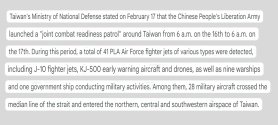I think it should generally be assumed at ANY target on the island of Taiwan whether Taiwanese or American, would be considered fair game during an invasion scenario, including any US troops which we know area already present in limited numbers.
I'm inclined to agree with you, but there's still quite a bit of ambiguity in the mix.
Generally speaking, diplomatic compounds are sacrosanct (even during war), but AIT isn't an embassy or consulate, at least not officially, and is certainly a base of operations for US military and intelligence personnel forward deployed to Taiwan.
The PLA might leave AIT alone should the Chinese authorities feel magnanimous despite AIT's ambiguous status, but considering what occurred in Belgrade in 1999, there's no guarantee just how things will play out.
This is just one example of a grey zone that could be in play if things get kinetic across the Taiwan Strait. I'm sure you can think of more examples.
The question of whether the U.S. will get involved will have been answered long before things go kinetic on Taiwan. And to be frank, at that point China won’t give a fuck what Congress does or doesn’t do. America isn’t the only one with nukes.
We might have to agree to disagree here.
Should the CMC direct the PLA to seize Taiwan by force, the US will almost certainly be able to approximate zero hour in advance.
Though that doesn't mean Uncle Sam will be poised to respond to zero hour immediately and kinetically. In all likelihood it'll take the US weeks, if not months to muster the requisite assets for a meaningful military response, assuming a meaningful military response can be both defined and achieved.
The longer it takes the US to muster forces, the more time Beijing will have to achieve a fait accompli in its seizure of Taiwan and its associated islands.
However, should pre-emptive PLA strikes inflict mass casualties upon US forces outside of Taiwan, then Congress will be forced to declare war to satiate domestic political pressure, regardless of whether some sort of conventional military victory is even feasible for the US.
IMHO, that's a path best to avoid.

